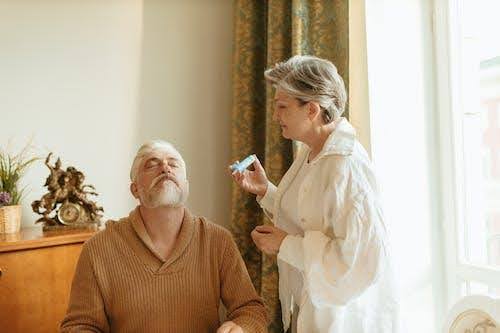In the domain of nursing, the care of elderly patients holds a place of increasing significance. As the population ages, nurses are more frequently encountering the unique complexities associated with senior care. Elderly patients present distinct challenges and needs that require specialized understanding and approach. This guide is designed to equip nurses with the essential knowledge and skills necessary for the effective care of this demographic. It will talk about the various aspects of elderly patient care, from understanding their unique needs to managing chronic conditions and ensuring their safety.
1. Understanding the Unique Needs of Elderly Patients
Caring for elderly patients necessitates a thorough understanding of the specific changes that occur with aging. Nurses must be aware of the physiological, psychological, and social transformations that impact the health and well-being of older adults. These changes can include decreased mobility, sensory impairments, and an increased risk of chronic diseases. Recognizing these unique aspects is crucial for developing effective care plans. Tailoring these plans to individual patients can significantly improve their health outcomes. By being attentive to these unique needs, nurses can better anticipate potential health issues and intervene promptly, enhancing the overall care experience for elderly patients.
2. Advancing Your Skills with Specialized Education
To excel in elderly patient care, nurses can greatly benefit from specialized education in gerontology. One of the options to enhance your skills is pursuing a masters adult gerontology degree online. Such programs provide in-depth knowledge and training in the specific health issues and care techniques relevant to older adults. These include managing chronic illnesses, understanding cognitive impairments, and addressing the unique psychological needs of the elderly. By selecting nurse specialty certifications in senior care, nurses can elevate their ability to offer high-quality care, meet the complex needs of elderly patients, and stay abreast of the latest practices in geriatric nursing.
3. Effective Communication Techniques
Effective communication is pivotal in providing quality care to elderly patients. Nurses must employ strategies that ensure clear and empathetic communication. This involves active listening, patience, and adapting communication methods to suit individual patient needs, especially for those with hearing impairments or cognitive challenges. Understanding and responding to non-verbal cues are also crucial, as some elderly patients may have difficulty expressing their needs verbally. Effective communication not only helps in accurately assessing patient needs but also builds trust and comfort, essential components in the nurse-patient relationship. By mastering these communication techniques, nurses can greatly enhance the care experience for their elderly patients.
4. Managing Chronic Conditions
Elderly patients often present with various chronic conditions that require careful management. Nurses play a key role in monitoring and managing these conditions, which can include hypertension, diabetes, arthritis, and heart disease. Effective management involves overseeing medication regimens, advising on lifestyle modifications, and collaborating with other healthcare professionals for a cohesive care plan. Regular monitoring of these conditions is crucial to prevent complications and deterioration. Educating patients and their families about managing these conditions at home is also an essential aspect of nursing care. By effectively managing chronic conditions, nurses can significantly improve the quality of life and health outcomes for elderly patients.
5. Promoting Mobility and Preventing Falls
Mobility is a crucial aspect of elderly care, and nurses play a vital role in promoting it. Encouraging regular, gentle exercises can help maintain muscle strength and flexibility, which are key in preventing falls – a common and serious concern for older people. Implementing fall prevention strategies, such as ensuring clear walkways and installing grab bars in bathrooms, is essential. Nurses should regularly assess the risk of falls and adapt the environment accordingly. By focusing on maintaining and improving mobility and by taking proactive measures to prevent falls, nurses can significantly enhance the safety and independence of their elderly patients.
6. Nutritional Needs and Considerations
Proper nutrition is paramount in elderly care, and nurses must be attentive to the specific dietary needs of older patients. Aging can affect appetite and the body’s ability to absorb nutrients, necessitating a careful approach to diet and hydration. Nurses should monitor nutritional intake and be aware of signs of malnutrition or dehydration. They can collaborate with dietitians to create individualized meal plans that accommodate specific health conditions, like diabetes or heart disease. Addressing issues such as difficulty in swallowing and providing guidance on nutrient-rich foods are also vital. By ensuring that elderly patients receive balanced nutrition, nurses can positively impact their overall health and well-being.
7. Addressing Mental Health and Cognitive Issues
Mental health and cognitive function are integral to the overall well-being of elderly patients. Nurses must be adept at recognizing signs of depression, anxiety, dementia, and other mental health or cognitive issues. Early detection and intervention are crucial in managing these conditions effectively. Providing support, ensuring a stimulating environment, and encouraging social interaction can help maintain cognitive function and mental health. In cases of severe cognitive impairment, nurses play a crucial role in creating a safe and familiar environment and in providing compassionate care that respects the dignity of the patient. By addressing these aspects holistically, nurses can help preserve the mental and emotional health of their elderly patients.
8. Pain Management in Elderly Patients
Effective pain management in elderly patients can be challenging due to factors like multiple health conditions and medication sensitivity. Nurses must conduct regular pain assessments and use appropriate pain management strategies, which may include both pharmacological and non-pharmacological methods. It’s important to consider the side effects of pain medication and the potential for interactions with other medications. Non-pharmacological approaches, such as heat therapy, massage, or relaxation techniques, can be effective adjuncts to medication. Tailoring pain management to each individual’s needs and regularly evaluating its effectiveness is key to providing relief and improving the quality of life for elderly patients.
9. End-of-Life Care Considerations
End-of-life care is a sensitive and crucial aspect of nursing care for older people. It involves not only managing physical symptoms but also providing emotional and psychological support to patients and their families. Nurses play a vital role in ensuring that the patient’s wishes are respected and that care is focused on comfort and dignity. Communicating openly and compassionately with families, helping them understand the process, and providing guidance on decision-making are essential components of end-of-life care. By providing compassionate and respectful care during this time, nurses can greatly ease the transition for patients and their families.
Conclusion
In conclusion, caring for elderly patients requires a comprehensive approach that addresses physical, nutritional, mental, and emotional needs. From promoting mobility and preventing falls to managing chronic conditions, ensuring proper nutrition, addressing mental health issues, managing pain, and providing end-of-life care, each aspect of care is crucial in enhancing the quality of life for elderly patients. This guide serves as a resource for nurses to develop a deeper understanding and expertise in elderly patient care. Through dedication, compassion, and continuous learning, nurses can make a significant impact on the lives of their elderly patients, ensuring that their golden years are lived with dignity and comfort.
























